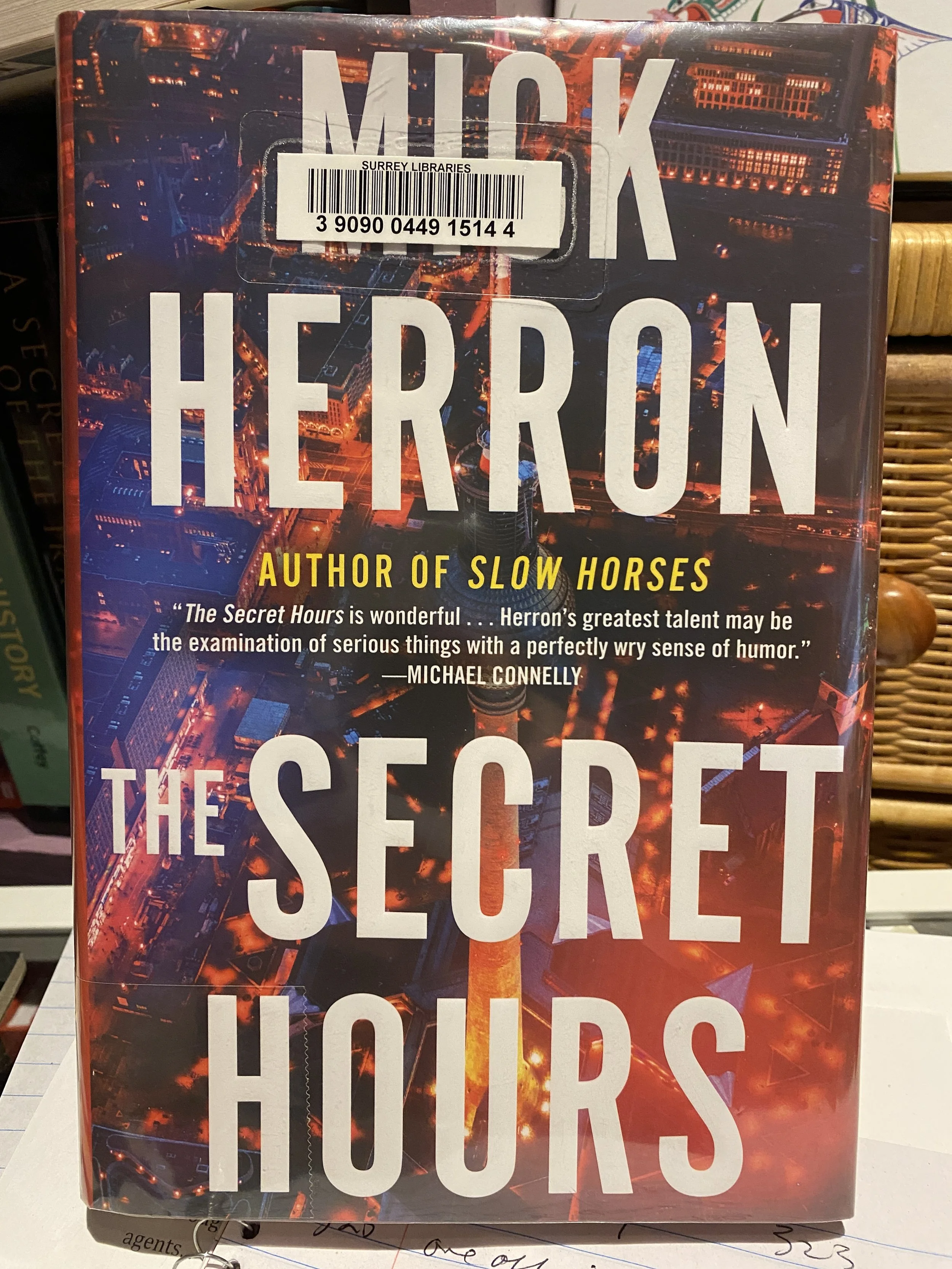The Secret Hours by Mick Herron
Mick Herron’s characters are unique and memorable and his plot is intricate and absorbing.
Equally, his work offers a shifting showcase of his brilliant use of language. Amid the sharp words of satire, he pauses to treat the reader to poetically lush imagery that takes us to the heart of the scene. When we follow Max through the darkness as he runs from his pursuer and “slips off the road and onto the green lane” holding his breath “as the hedgerow healed behind him, and the long grass drew its curtain.”
Like previous books, this novel is an astute and contemporary skewering of the Park (as the spy agency is referred to) and its related bureaucracy. On fact-finding panels like Monochrome, thinks the cynical Second Chair, the members are “at best an interchangeable array of backbench lightweights, quasi-famous names, along with a stiff trolleyed in from the Lords to add a dash of ermine.”
As the inquiry grinds on, two of its members, even on their best days, come to resemble men who have “spent their middle decades slipping around the back for a smoke, a rare example of appearances failing to deceive.”
Current social mores are portrayed with an often hilarious precision. When Malcolm has the temerity to refer to Griselda’s being black and female as “advantages,” she forbears to tell him that she would have risen higher “if not for the bullies and the bigots.”
Thinking about this later, she realizes that the bullies and bigots are “among the more minor obstacles” she’s had to face, “and in many ways the easiest to deal with.” Far worse than casual overt racism is “the institutional variety…veiled and obfuscated by Civil Service procedures that had been hallowed by time.” In a brief sidelong swat at manners and attitudes, Herron alludes to a special kind of “freezing contempt perfected by teenagers, French waiters, and the English middle class.”
Sparrow, the PM’s influential adviser, tells Griselda “the real art of politics” is “knowing when the next fuck-up’s due and arranging for a human sandbag to be standing in the way.” In other words, he decides “who’s to blame before anything goes wrong,” in order to “make the subsequent investigation easier.”
Exposing collusion between business and government, Herron indulges in some bizarre imagery, comparing the financially intricate and interdependent companies that got a huge NHS contract for PPE to “a three-legged ceilidh…performed by thirteen drunken quadrupeds.” The press gets a sharp slap for routinely failing to follow up the happy announcement with what happens next, because “the headlines had already been written by then, and the news spotlight moved on.”
Herron also deploys language to create a certain poignant sympathy for our characters. We learn that First Desk is aging by the way she watches an airplane fly overhead and realizes that in younger years, “she could barely notice an evening aeroplane without wishing to be on it,” but the years “have a way of laying such aimless desires to rest.”
When an explosive file of information comes into Malcolm’s hands, he views it as potential “radioactive waste” as he analyzes it. Is it real? Fake? Or a combination?
Meanwhile, Molly Doran labours among the paper archives in the basement of Regent’s Park, which have “long since ceased to grow.” Often she does no more than bestow “a kiss with a rubber stamp: DECOMMISSIONED, DECLASSIFIED, DECEASED.” On other occasions, she adjusts the files to read RECLASSIFIED, REDACTED, RESOLVED — not in an attempt to alter the facts, but to turn them to catch another light, “the way one might change a landscape by looking at it from a different place.” Even as she carries out these tasks, Molly is well aware that “The present wins every battle, but the past always wins the war.”
A good thing about working at the Park is that there’s no danger of being fired. “It was called the Civil Service for a reason and sacking you would be the height of ill manners.” Still, it was best to avoid consequences—”everyone knew that. Results were what you were after. Results put an end to a matter and allowed it to be filed. Consequences suggested that things remained ongoing, which suggested in turn that they were not under control.”
We often read fiction seeking deeper and wider truths, and this author delivers rich food for thought. For instance, a witness who is being interviewed by the Monochrome panel ponders the nature of memory. “The first time things happen, they do so in the correct order. Afterwards, there’s more of a scattergun approach.” This randomness in how we access memories may not directly help us to live our lives, but it does point out the disordered and often unreliable nature of the memories we feel so sure of. As for history, it “alters the landscape” without changing the people.
Herron’s story moves at a good clip. Following it, we laugh with recognition at the world where “spooks think around corners they’ve built themselves” and no matter how badly a nation is governed, “there is always room for deterioration.” We are also given a cautionary tale cynically delivered. If one is good enough at hiding dirty secrets, “in today’s world, this amount[s] to squeaky clean.”
And as one enterprising villain explains, “it’s about control, and control means data. If you own the platforms on which people conduct their business, you effectively own that business, and if you own the platforms on which those same people pursue their leisure interests, you effectively own their lives.” It’s only a point of view, he tells his interlocutor, but undoubtedly one we’d all do well to think about.

